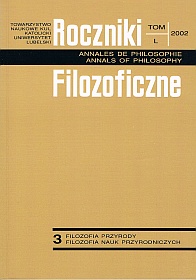Was Gottlob Frege First to Define Natural Numbers?
Abstract
It is commonly thought that natural numbers were first defined by G. Frege (1884), and independently, by B. Russell (1903). This article based on the J. Berg's observations (who was a famous researcher of B. Bolzano's life's work) proves that the philosopher and mathematician from Prague, as early as the 1830s applied his definition of the natural numbers - the so-called abstract, unnamed numbers. Bolzano's definition follows the same line of development as the conception of G. Frege and B. Russell because it is based on the concept of equality of sets. Bolzano's concept of natural numbers has remained unknown because he did not base his arithmetic on the concept of abstract, unnamed numbers. In addition, the manuscript Pure Numbers was not published until 1976.
References
Berg J.: Einleitung des Herausgebers, [w:] B. Bolzano, Reine Zahlenlehre, hrsg. v. J. Berg, Stuttgart−Bad Cannstatt: Friedrich Frommann Verlag (Günther Holzboog) 1976, s. 7-9.
Berg J.: Einleitung des Herausgebers, [w:] B. Bolzano, Wissenschaftslehre, par. 223-268, hrsg. v. J. Berg, Stuttgart−Bad Cannstatt: Friedrich Frommann Verlag (Günther Holzboog) 1988, s. 7-44.
Bolzano B.: Reine Zahlenlehre, hrsg. v. J. Berg, Stuttgart−Bad Cannstatt: Friedrich Frommann Verlag (Günther Holzboog) 1976.
Borkowski L.: Logika formalna, Warszawa: PWN 1970.
Danek J., Weiterentwicklung der Leibnizschen Logik bei Bolzano, Meisenheim am Glan: Hain 1970.
Frege G.: Die Grundlagen der Arithmetik, Breslau 1884.
Marciszewski W.: Bernard Bolzano, [w:] Mała Encyklopedia Logiki, Wrocław: „Ossolineum” 19882, s. 26.
Russell B.: The Principles of Mathematics, Cambridge: Cambridge University Press 1903.
Copyright (c) 2002 Roczniki Filozoficzne

This work is licensed under a Creative Commons Attribution-NonCommercial-NoDerivatives 4.0 International License.





